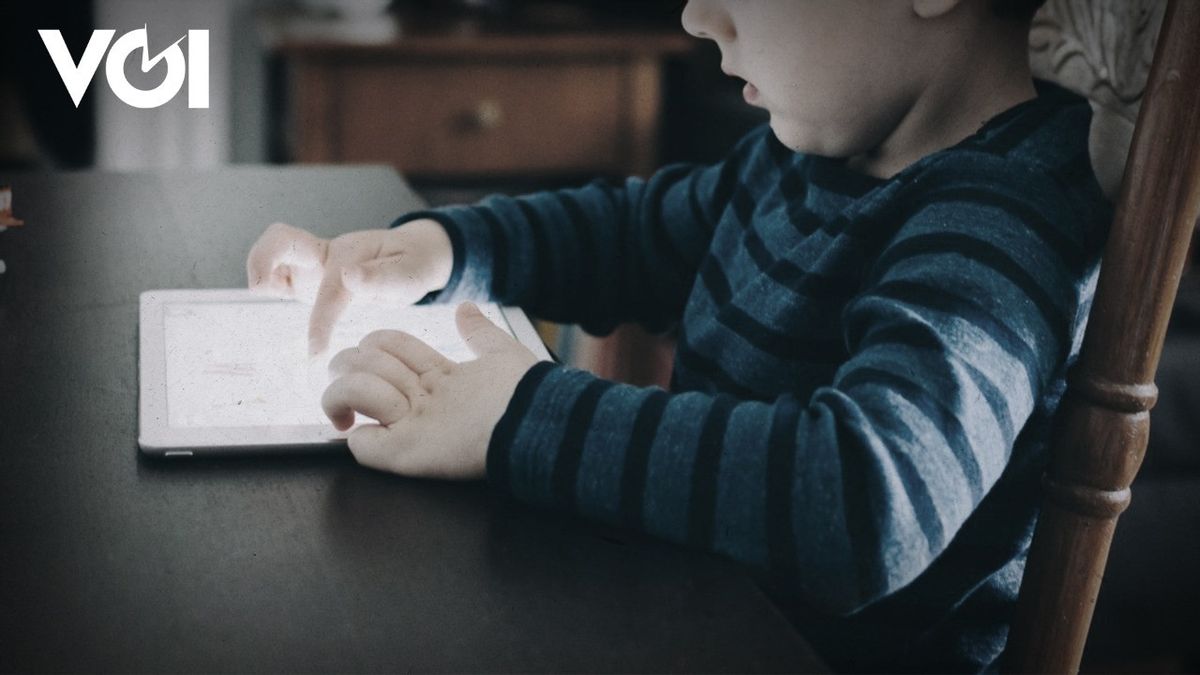Now gadgets are often used as a "main weapon" for parents to make their children calm. The content provided as attractive as possible on the gadget effectively makes the children locked their attention. The child is calm, the parents are happy. Yet if it's allowed, this habit can have fatal consequences for the development of children. Especially for the baby who is in the golden age. Back in VOI's typical Article Series. In this edition of "Giving the Golden Age of Children," we will discuss how to optimize the development of children in the golden age.
Some time ago, the thread that was distributed by Doctor K.S. Denta (@sdenta), who was taking a specialization program for children, went viral on social media. He revealed his findings regarding the slowdown in children's development after being familiar with gadgets. Not only did it slow down, some even couldn't speak, didn't want to play with other children of their age, and tantrums.
Denta explains that screen time via gadgets is more personal and makes children focus on the screen almost 100 percent. Unlike the television screen that can be watched with the family so that control remains with adults.
According to Denta, the current content is made as attractive as possible, which makes children's attention locked there. "Parents are happy because the child is calm. They buy a tablet and are given a cute protector," he wrote.
In fact, children should need a variety of stimulation when they are under five. Not only visuals, but also sounds, smells, varied and dynamic touches in two directions with the environment and includes physical and social activities.
I have met several patients with toddlers who at first are okay with their development, suddenly when they meet gadgets, their development slows down, even stagnates, can't speak, don't want to play with others, even tantrums. Why is it so? ~ a thread ~ pic.twitter.com/l18wt92OJ3
— K. S. Denta (@sdenta) March 21, 2021
Indeed, the number of toddlers who actively use devices is not small. What's more, during the COVID-19 pandemic, the use of devices in children has increased.
As noted by the Central Statistics Agency (BPS) on December 16, 2020, many young children are already using gadgets. Toddlers aged 1-4 years, for example, recorded 25.9 percent of them actively playing gadgets, even 3.5 percent of children less than a year old have also begun to be introduced to gadgets. Children aged 5-6 years, 47.7 percent, had the most access.
It cannot be denied that the benefits of using technology are so great for children. Originally used wisely and is still under supervision. However, like a double-edged knife, if the use of devices for children is not controlled properly, it will cause various negative impacts.
Negative Impact
It should be noted that the very sensitive growth period of children is between 1 and 5 years old or what is commonly called the golden age. All aspects of intelligence such as intellectual, emotional, and spiritual underwent tremendous development.
In this golden age, information will be absorbed quickly. Children become imitators and smarter than adults think. In addition, this period is also the basis for the formation of character, personality, and cognitive abilities.
Research published in the journal Gadget Use in Early Childhood: New Challenges for Millennial Parents, shows that there are complaints after children start using gadgets. As much as 40 percent of children go berserk if they are not given a device.

In addition, some supporting research also shows that children who use the device for too long have speech problems, limited vocabulary, unclear articulation, and problems with emotional development. The interaction of children and parents is a key factor in stimulating children's speaking ability to improve speaking fluency. When children use gadgets, communication with parents is reduced. Therefore, the lack of communication and interaction between parents and children can delay the child's ability to speak fluently.
Still, in the same journal, there is a purpose why parents give their children gadgets. As much as 22 percent so that children are smarter, 21 percent so that children are not fussy, while the largest proportion is others, namely 34 percent.
For parents who are ignorant about the long-term effects of using the device, they allow the children to continue playing with it as a lure so that the child doesn't get fussy. This happened to one of the children who were the subject of research in the journal The Effect of Gadget Toward Early Childhood Speaking Ability by Nirwana, A. Musda Mappapoleonro, and Chairunnisa. Research from the journal found that the child had limitations in communicating with the surrounding environment, including his parents. According to the parents, in a day the child can play with the device for up to 10 hours and it lasts for two years. When the child enters the age of 2.5 years, the parents feel there is an abnormality in their speech ability.
"He is not like other children his age who can communicate with his parents. His response to the people around him is also reduced. His ability to pick up on language is lacking. In 2018, the child entered the age of 3.5 years and still had difficulty speaking. His vocabulary. in saying one sentence there are only two words," as quoted from the journal.

Guidelines for using devices for children
The use of gadgets nowadays may be difficult to avoid, but that does not mean that it is impossible to supervise. The UK is the first country to launch guidelines for parents to be able to supervise and control the use of devices on their children. The Royal College of Paediatrics and Child Health describes how to manage screen time.
First, stay alert but don't interfere or judge the use of your device. It's important to know what apps and networks kids engage with, how they work, and what content they're most likely to enjoy. In addition, children will learn more from examples than from instructions. This means that the parents themselves also try to stop for a moment using the device when they are around the child and continue to interact with the child.
If you have really succeeded in controlling children's devices, don't let them get bored for too long and make them look for gadgets again. Moreover, children need regular play and interaction, therefore it is hoped that parents can provide space or encourage children to be more active by playing and regular space for conversation. Maybe parents can provide more interactive toys so that children's attention is not just focused on the device. Toys that can be used include toy blocks, legos, or puzzles.
The guidelines also suggest that an hour before bedtime, children are not exposed to smartphone use, so that their brains have time to rest without being stimulated by screen light. Some devices have introduced 'Night mode' which emits less blue light, but there is no evidence that this is effective. Therefore, these guidelines insist that an hour before bedtime children should completely remove the use of their devices.
The English, Chinese, Japanese, Arabic, and French versions are automatically generated by the AI. So there may still be inaccuracies in translating, please always see Indonesian as our main language. (system supported by DigitalSiber.id)













